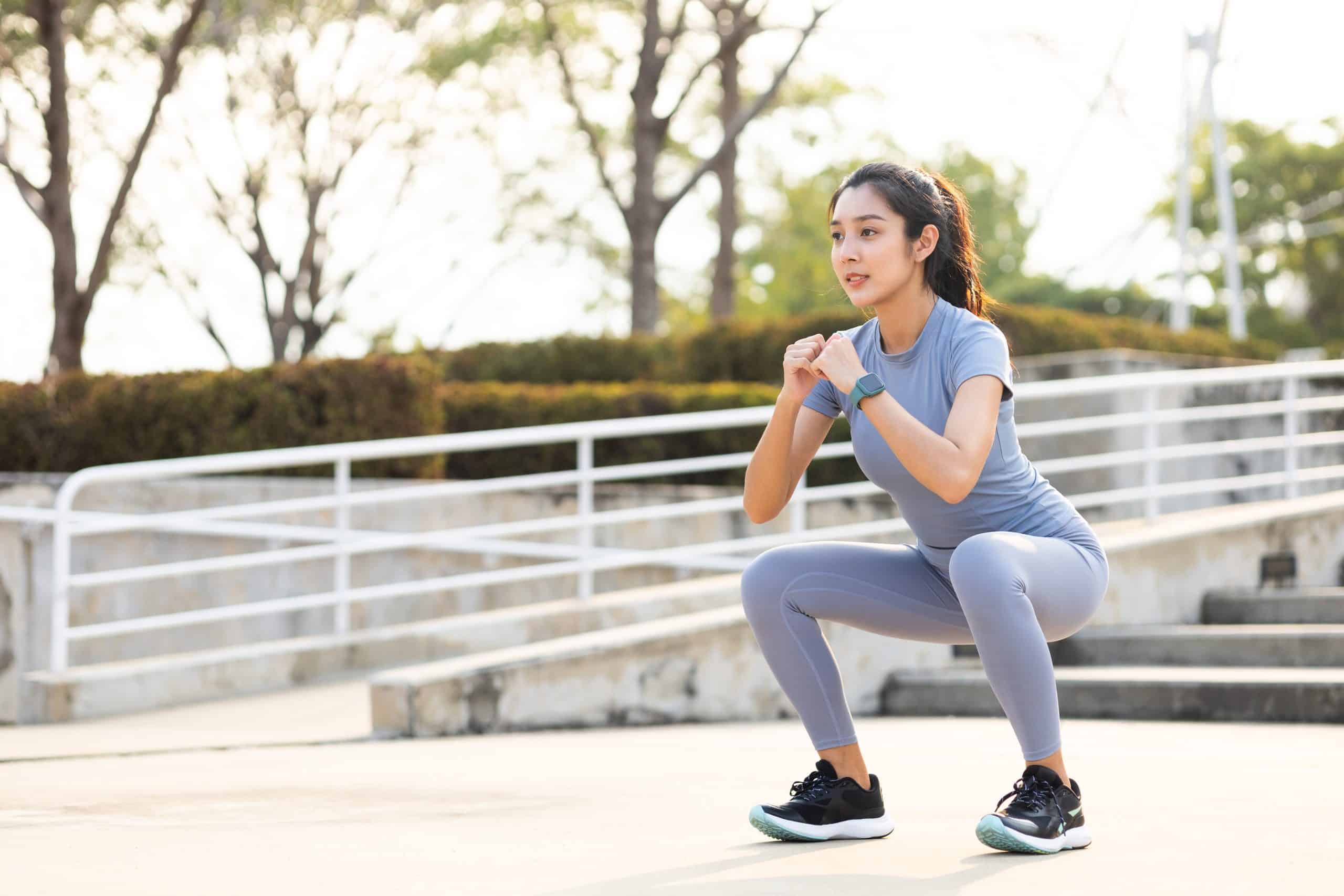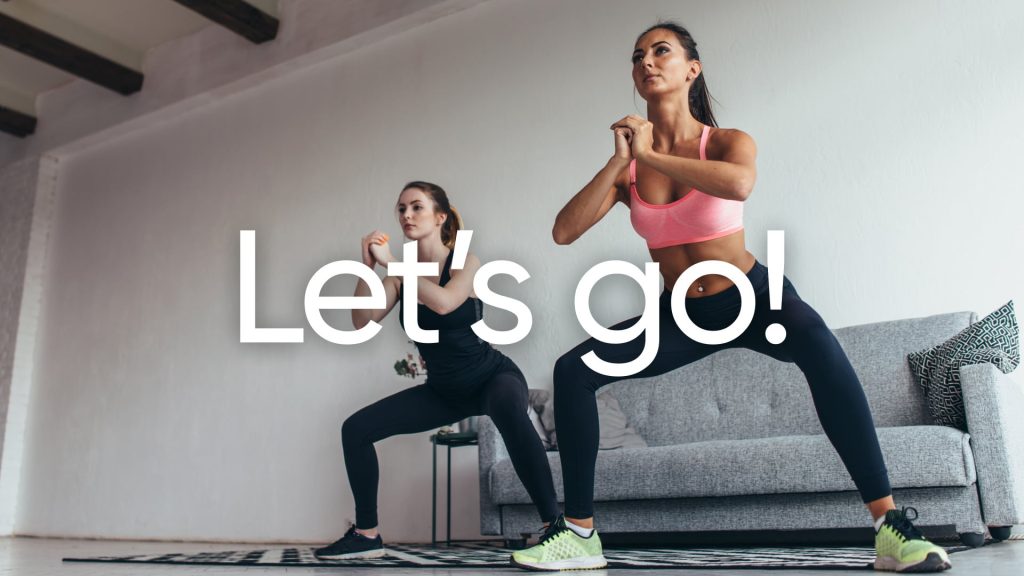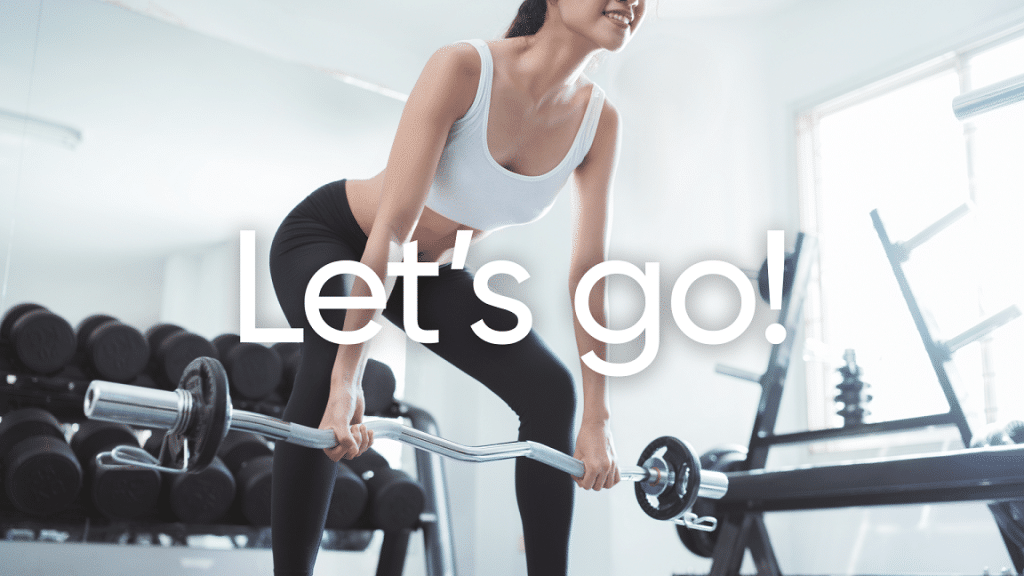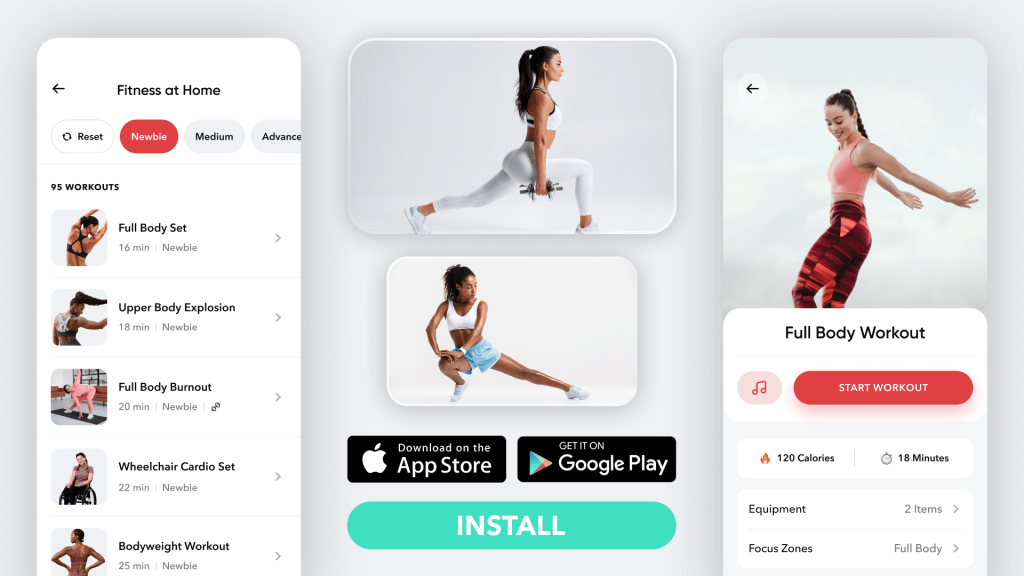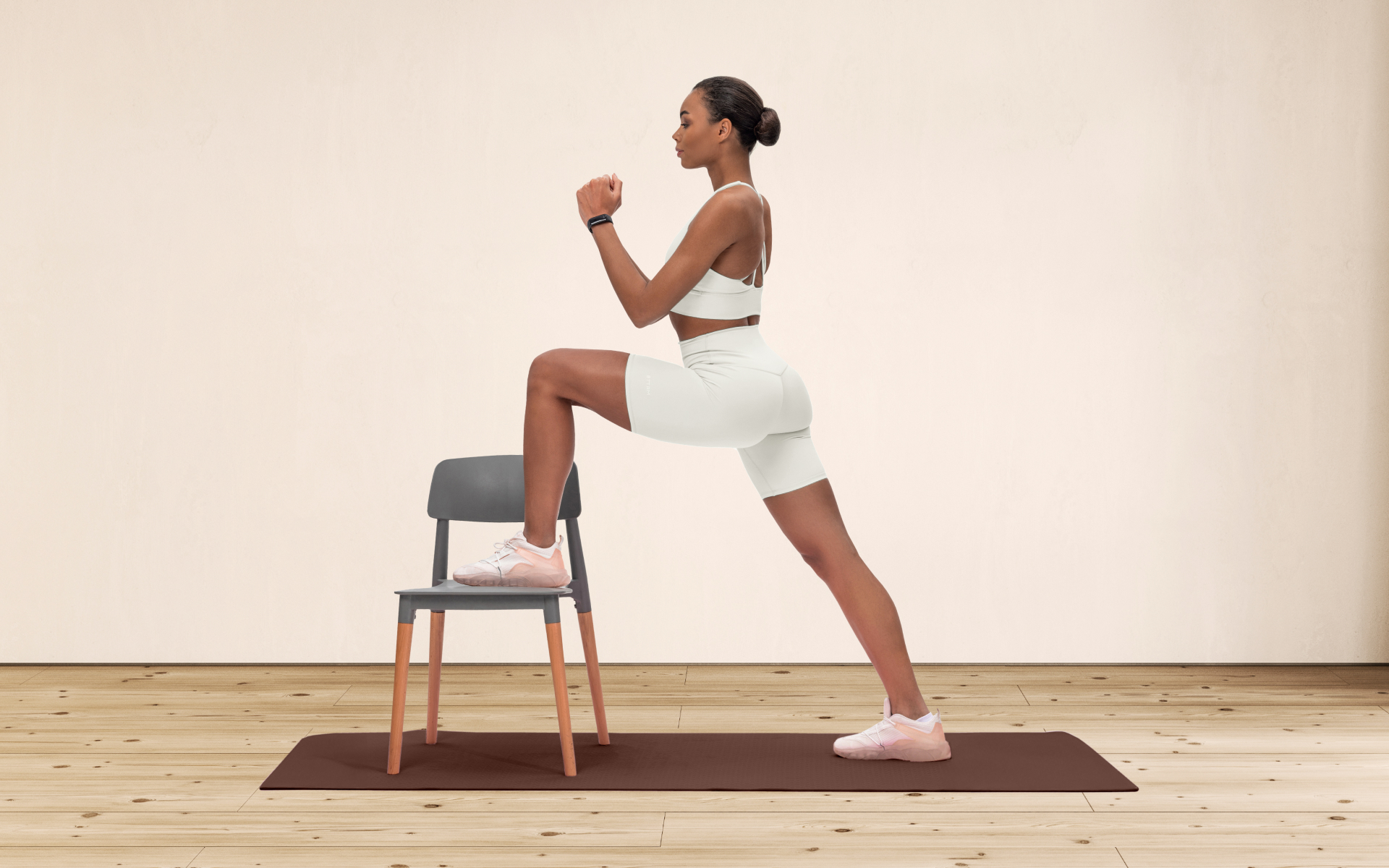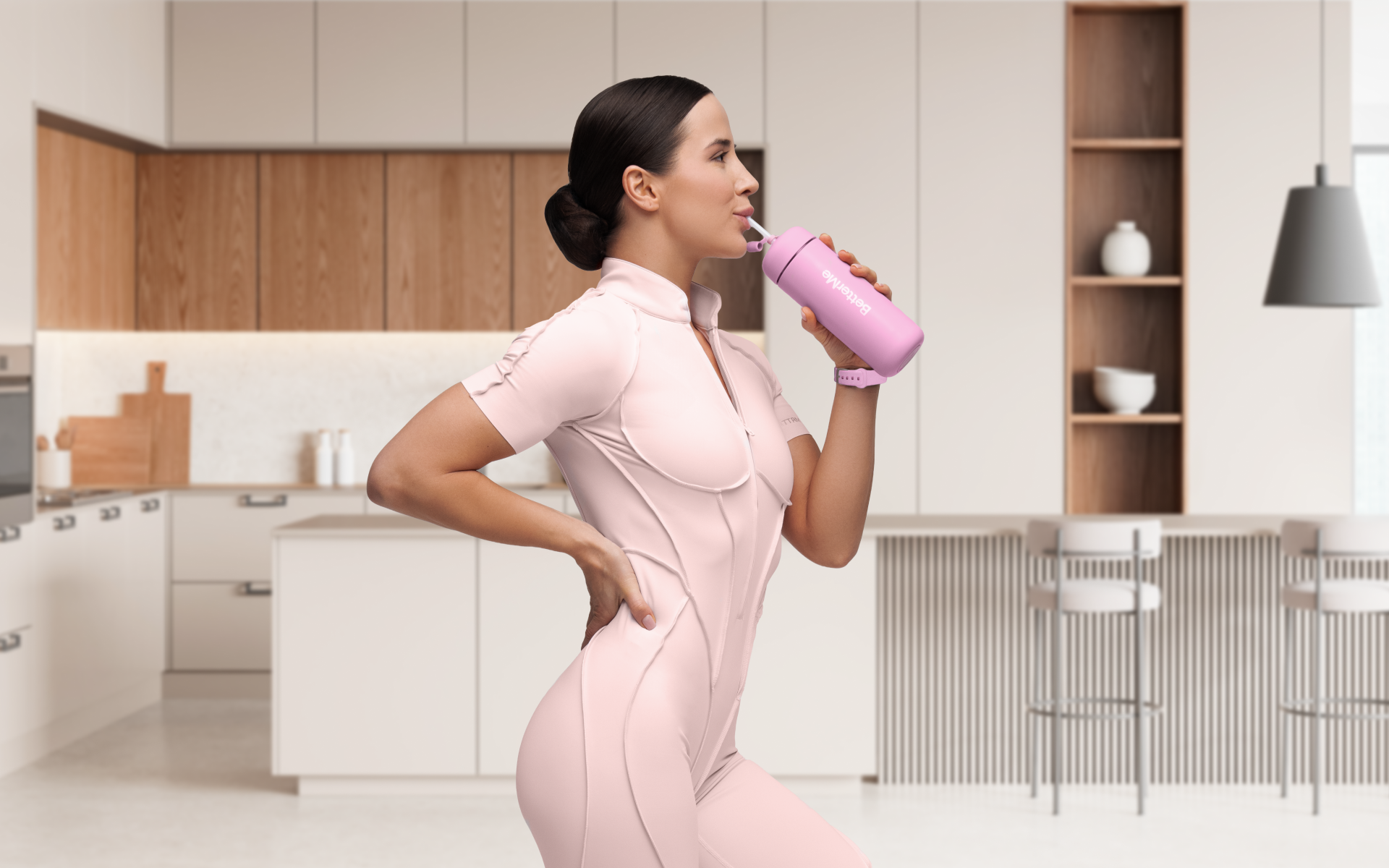Research shows that strength training can indeed be a valuable part of a weight loss strategy. Strength training increases calorie consumption in a number of ways. First, you use up a considerable amount of energy performing the exercise. Furthermore, strength training exercises, including squats, helps to build muscle. And when muscle is at rest, it burns more calories than fat (3). So not only are you burning calories while you’re actually doing the squats, but your body continues to burn more calories even after the workout is over, thanks to the extra muscle you’ve built. This process, known as excess post-exercise oxygen consumption (EPOC), can significantly boost your overall calorie burn (1). Keep in mind that having an estimate of squats calories burned can be helpful in planning your weight loss goals. Here’s what you need to know.
Get your personalized
meal plan!
How Many Calories Does 100 Jump Squats Burn?
Jump squats are an intense exercise that combines the benefits of strength training and cardio. On average, a person can expect to burn between 33 to 56+ calories per 100 jump squats, depending on factors like body weight, muscle mass, and intensity level.
Factors affecting calorie burn:
- Body weight: The heavier you are, the more energy (calories) you’ll burn doing the same exercise.
- Muscle mass: More muscle means a higher metabolism, which increases calorie burn.
- Intensity level: The harder you work, the more calories you burn.
How Many Calories Does 100 Bodyweight Squats Burn?
Bodyweight squats are less intense than jump squats but still provide a good workout. On average, doing 100 bodyweight squats will burn approximately 32 calories.
Factors affecting calorie burn:
- Body weight: A heavier person will burn more calories doing squats than a lighter person.
- Muscle mass: People with more muscle mass burn more calories, even at rest.
- Intensity level: Faster squats with less rest time in between will burn more calories.
How Many Calories Do Squats Burn With Weights?
Adding weights to your squats increases the intensity of the exercise, leading to a higher calorie burn. The exact number of calories burned will vary greatly depending on the weight used, the number of repetitions, the pace of the workout, and the individual’s body composition.
However, as a rough estimate, a person could burn around 100-200 calories during a 15-minute weighted squat workout.
Factors affecting calorie burn:
- Weight used: The heavier the weight, the more effort it takes, which equals more calories you burn.
- Number of repetitions: More reps mean more work and more calories burned.
- Pace: Fast-paced workouts with little rest in between sets burn more calories.
- Body composition: People with more muscle mass burn more calories.
How Much Does 30 Squats Burn?
Doing 30 bodyweight squats would burn roughly 10 calories, based on the estimate of 32 calories for 100 squats. However, if these are jump squats you could burn around 100 calories. If you’re using weights, the calorie burn would be higher, possibly around 30-60 calories for a set of 30, depending on the weight used and your individual characteristics.
Read More: The Best Beach Workout Equipment For Maximizing Your Seaside Sweat Sessions
What Will 100 Squats For 30 Days Do?
There are some benefits from consistently performing squats:
Strengthen Your Lower Body And Core
Squats are a comprehensive lower body and core workout. When you squat, you engage your quadriceps, hamstrings, glutes, and calves. At the same time, your abdominal and lower back muscles work to stabilize your body.
As you lower your body into a squat, your muscles have to contract to control the movement. This contraction, especially when repeated over multiple repetitions and sets, causes the muscles to strengthen and grow (4).
A strong lower body and core are essential for everyday activities like walking, lifting, and balance (6). Plus, stronger muscles can improve your athletic performance and make other exercises easier to perform.
Increase Your Bone Strength
Squats are a weight-bearing exercise, meaning they put stress on your bones. This stress, in turn, stimulates the activity of cells that build new bone, leading to increased bone density.
When you squat, especially with added weights, your bones have to bear the load of your body plus any extra weight. This stimulates your body to deposit more calcium into your bones, making them denser and stronger (5).
Strong bones are less likely to break or fracture. They also help to prevent osteoporosis, a condition that weakens bones and makes them prone to fractures.
Boost Your Calorie Burn
Because squats work multiple large muscle groups at once, they burn a significant number of calories both during and after your workout.
The high energy expenditure of squats comes from the effort your muscles need to exert to perform the movement. Plus, the more muscle mass you have, the higher your resting metabolic rate, meaning you’ll burn more calories even when you’re not exercising.
Burning more calories can help with weight management and fat loss. In addition, the muscle-building effects of squats can lead to long-term increases in your calorie burn (5).
Looking for a way to break the vicious cycle of weight loss and tone up all the jiggly parts? Watch the extra pounds fly off and your muscles firm up with the BetterMe app!
Improve Your Mobility And Balance
Regularly performing squats can enhance your mobility by increasing the flexibility of your hips, knees, and ankles. They also improve balance and coordination, reducing the risk of falls and injuries (2).
Squats require you to maintain balance as you move your body up and down. This engages your core and stabilizing muscles, helping to improve your balance over time (6).
Improved mobility can make everyday movements easier and more comfortable. Better balance can reduce your risk of falls, which is especially important as you get older.
Enhance Your Posture
Squats can help correct poor posture by strengthening the muscles of the lower back and core. A stronger core allows for better support of the spine, which can lead to improved posture over time (4).
When you perform a squat, your core has to work to keep your body upright. This strengthens the muscles that support your spine, helping to improve your posture. Good posture can reduce back pain and decrease the risk of back injuries (6). It also helps you look more confident and can even improve digestion and breathing.
Prevent Injuries
By strengthening the muscles, tendons, and ligaments around your major joints (especially the knees and hips), squats can help prevent injuries both in daily activities and other forms of exercise (4).
Squats strengthen the muscles around your hips and knees, two areas prone to injury. Strong muscles provide more support to these joints, reducing the risk of injuries like sprains and strains.
Preventing injuries can help keep you active and healthy. Keep in mind that avoiding an injury can save you from pain and time off from your workout routine.
Boost Your Athletic Performance
Squats can help improve your athletic performance by strengthening your lower body and core muscles. A strong lower body is crucial for many athletic activities like running, jumping, and cycling.
Squats are a functional exercise, meaning they train your muscles to work together and prepare them for daily tasks by simulating common movements. The strength and power gained from squats can translate into improved speed, agility, and endurance in various sports and activities (4).
Improving your athletic performance can make you more effective in your chosen sport or activity. Additionally, the enhanced strength and coordination gained from squats can reduce your risk of sports-related injuries.
Enhance Your Circulation
Regular exercise, including squats, can improve your blood circulation. Better circulation allows more oxygen and nutrients to reach your muscles, organs, and other tissues (2).
When you exercise, your heart rate increases to supply more oxygenated blood to your working muscles. This increased blood flow enhances circulation throughout your body, not just during the workout, but also for hours afterward.
Better circulation can improve your overall health by ensuring that all parts of your body receive the oxygen and nutrients they need. It can also help speed up recovery after workouts, reduce muscle soreness, and improve skin health.
Read More: Beach Workout No Equipment: 8 Bodyweight-Only Exercises To Try
Improve Your Posture
Squats can help improve your posture by strengthening your back muscles and core. A strong core is essential for maintaining proper posture, as these muscles support your spine and keep your body upright (4).
When you perform a squat, your core and back muscles have to work to keep your body upright and balanced. Over time, this activity can strengthen these muscles and lead to improved posture.
Improved posture can prevent back pain and decrease the risk of spine problems. Good posture also helps you look taller and more confident.
Increase Your Metabolism
Squats, especially when performed with weights, can increase your metabolism. This means your body will burn more calories even when at rest (4).
Squats are a type of strength training exercise, and strength training increases your muscle mass. Muscle tissue burns more calories than fat tissue, even at rest. This means that the more muscle you have, the higher your resting metabolic rate.
An increased metabolism can help with weight loss and management. It means your body will burn more calories throughout the day, even outside of your workouts. It can also help you maintain muscle mass as you age, promoting a healthier body composition (5).
Should You Do 100 Squats For 30 Days?
Whether or not you should perform squats every day depends on your fitness goals, current fitness level, and overall health. Squats are a fantastic exercise that works several muscle groups, increases strength, and improves flexibility. However, like any other exercise, they also require rest for optimal results.
If you’re new to exercising or have a history of knee or back injuries, doing squats every day might be too much. Overuse can lead to injuries, and it’s important to allow your muscles time to recover and grow. In this case, you might want to start by doing squats two to three times a week.
For more experienced exercisers or those with specific strength-building goals, daily squats could be beneficial. Some athletes follow a “squat every day” program that involves varying the type of squat and the intensity every day to stimulate muscle growth and increase strength.
That said, it’s essential to listen to your body. If you’re feeling pain (beyond normal muscle soreness) or if you’re too tired to maintain proper form, it’s a good idea to rest.
If you tend to let yourself off the hook, raise the white flag when things get tougher than you expected, send yourself on an unconscious binge-eating trip – BetterMe app is here to help you leave all of these sabotaging habits in the past!
Frequently Asked Questions
Is 100 Squats A Day Good?
Performing 100 squats a day can certainly be beneficial, particularly if you’re looking to strengthen your lower body and core muscles. However, it’s important to make sure you’re performing the exercise with proper form to avoid injury.
Over time, your body may adapt to this routine, and you might need to increase the intensity either by adding weights or trying more difficult variations of squats.
Will 200 Squats A Day Help?
Just as with 100 squats, doing 200 squats a day can help to build strength and muscle tone in your lower body. It’s crucial to keep in mind that fitness isn’t just about quantity. Quality also matters.
Performing 200 well-executed squats can certainly be beneficial, but doing them incorrectly could lead to injuries. It’s also important to incorporate other exercises into your routine for a balanced workout.
How Many Squats Should I Do A Day To See Results?
The number of squats you should do per day to see results depends on your fitness level, goals, and other factors like your diet and sleep schedule. As a general guideline, you might start with 15 to 20 squats per day, gradually increasing as you get stronger. Keep in mind, it’s not just about the number of squats you do.
Consistency, proper form, and progressively challenging your muscles (by adding weights, for instance) are key to seeing results. Remember, it’s always a good idea to consult with a fitness professional to develop a workout routine that’s best for you.
The Bottom Line
The number of calories burned by doing 100 squats varies depending on factors such as your weight, intensity level, and individual metabolism. That said, consistently incorporating squats into your workout routine can contribute to overall calorie burn, muscle strengthening, and improved fitness.
DISCLAIMER:
This article is intended for general informational purposes only and does not serve to address individual circumstances. It is not a substitute for professional advice or help and should not be relied on for making any kind of decision-making. Any action taken as a direct or indirect result of the information in this article is entirely at your own risk and is your sole responsibility.
BetterMe, its content staff, and its medical advisors accept no responsibility for inaccuracies, errors, misstatements, inconsistencies, or omissions and specifically disclaim any liability, loss or risk, personal, professional or otherwise, which may be incurred as a consequence, directly or indirectly, of the use and/or application of any content.
You should always seek the advice of your physician or other qualified health provider with any questions you may have regarding a medical condition or your specific situation. Never disregard professional medical advice or delay seeking it because of BetterMe content. If you suspect or think you may have a medical emergency, call your doctor.
SOURCES:
- 7 Things to Know About Excess Post-exercise Oxygen Consumption (EPOC) (2017, acefitness.org)
- 12 Benefits of Squats – Updated (2019, urbanfitness.com.au)
- Muscle cells vs. fat cells (2020, medlineplus.gov)
- Resistance training – health benefits (2022, betterhealth.vic.gov.au)
- Resistance training is medicine: effects of strength training on health (2012, nih.gov)
- The real-world benefits of strengthening your core (2012, harvard.edu)
